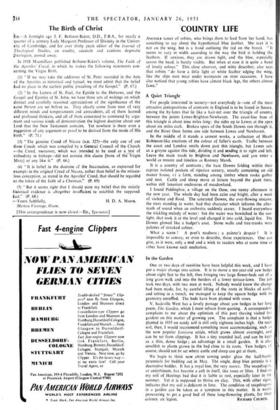The Birth of Christ
Ent,—A fortnight ago J. F. Bethune-Baker, D.D., F.B.A., for nearly a quarter of a century Lady Margaret Professor of Divinity in the Univer- sity of Cambridge, and for over thirty years editor of the Journal of Theological Studies, an erudite, accurate and cautious dogmatic theologian, passed away.
In 1918 Macmillans published Bethune-Baker's volume, The Faith of 'the Apostles' Creed, in which he makes the following statements con- cerning the Virgin Birth.
(1) " If we may take the addresses of St. Peter recorded in the Acts of the Apostles as historical and typical, we must admit that the belief bad no place in the earliest public preaching of the Gospel." (P. 67.) (2) " In the Letters of St. Paul, the Epistle to the Hebrews, and the Gospel and Epistles of St. John, we have three sets of writings on which distinct and carefully reasoned appreciations of the significance of the same Person are set before us. They clearly come from men of very different minds and temperaments and antecedents, all of them learned and profound thinkers. and all of them concerned to commend by argu- ment and various kinds of demonstration the highest doctrine about our Lord that the New Testament contains. Yet nowhere is there even a suggestion of any argument or proof to be derived from the mode of His birth." (P. 71.)
(3) "The genuine Creed of Nicaea (A.D. 325)—the only one of our three Creeds which was compiled by a General Council of the Church —the Creed, moreover, which was intended to be used as a test of orthodoxy in bishops—did not contain this clause [born of thes—Virgin Mary] or any like it." (P. 66.)
(4) "It is belief in the doctrine of the Incarnation, as expressed for example in the original Creed of Nicaea, rather than belief in the miracu- lous conception, as stated in the Apostles' Creed, that should be regarded as the token of the faith of a Christian." (P. 69) (5) " But it seems right that I should state my belief that the strictly historical evidence is altogether insufficient to establish the supposed tact." (P. 68.)
Pills correspondence is now closed.—ED., Spectator.]






































 Previous page
Previous page